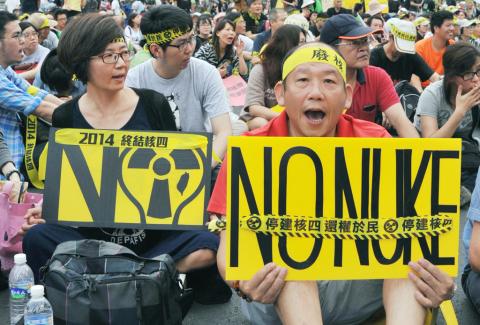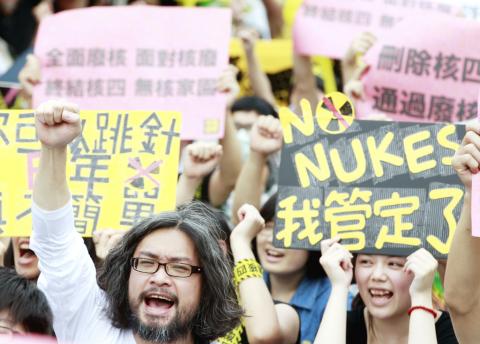Tens of thousands took to the streets of Taipei yesterday afternoon in an antinuclear protest that also occupied a section of Zhongxiao W Road in front of Taipei Railway Station.
At 3pm, Ketagalan Boulevard was packed with protesters wearing yellow ribbons that read: “Stop the Fourth Nuclear Power Plant. Give Power Back to the People,” as they listened to speeches and prepared to march.
Green Citizens’ Action Alliance chairperson Lai Wei-chieh (賴偉傑) said the government had threatened the public with increased electricity bills and weakening competitiveness if the nation gives up nuclear power, but he said that Germany — an example cited by the government — uses a different electricity price calculation model, has strong global competitiveness and has the most sustainable energy sector in the world.

Photo: Mandy Cheng, AFP
Taiwan Power Co’s (Taipower, 台電) data showed 197 components of the plant’s No. 2 reactor have been removed and installed into the No. 1 reactor, Lai said, adding that he did not trust the safety inspections being carried out by Taipower and the designer, General Electric Co.
“How can we feel safe about the plant?” Lai asked.
“We live in a beautiful country where you can reach the sea and the mountains in the same day, so why destroy such a beautiful place?” film director and frequent participant in antinuclear demonstrations Ko I-chen (柯一正) said. “If you [the government] cannot deal with nuclear waste, you should not create more.”

Photo: Pichi Chuang, Reuters
Former Democratic Progressive Party chairman Lin I-hsiung (林義雄), who is on hunger strike, represents the will of millions of Taiwanese, Ko said, adding that it is shameful that President Ma Ying-jeou’s (馬英九) administarion has treated him like “a child asking for candies.”
Green Citizens’ Action Alliance secretary-general Tsuei Su-hsin (崔愫欣) read out the protesters’ “non-cooperation movement” statement.
“We have two demands — stop construction of the Fourth Nuclear Power Plant, retire the operating plants as soon as possible and amend the ‘bird-cage’ Referendum Act (公民投票法),” Tsuei said. “Yet officials in power still neglect our demands, stall and shirk their responsibilities with excuses.”

Photo: Fang Pin-chao, Taipei Times
Holding signs reading: “I am a mother and against nuclear power,” several women said they formed a mothers’ group on Facebook when they saw students being injured by police officers during the forced eviction of protesters from the Executive Yuan last month.
“We treat all Taiwanese children as our children. How can we cower away and not protect them?” Sung Ya-chuan (宋雅娟) said.
Within an hour, the parade reached Zhongxiao W Road, where many protesters removed the center road blocks so that they could occupy both sides of the road and paralyze the traffic, triggering police to declare the protest illegal.
However, with protesters continuing to pack both sides of the road, riot police departed shortly afterwards, with the crowds applauding and cheering their departure.
Organizers sounded a simulated nuclear emergency warning siren and asked protesters to lay on the ground, mimicking the scene of a real nuclear disaster.
A woman surnamed Wang (王) from Greater Taichung said she first attended an antinuclear protest as a child in 2000 with her mother, and that now, as an adult, she wanted to protest because there is no safe way of dealing with nuclear waste.
A woman surnamed Wu (吳), a mother accompanied by her baby in a stroller, three-year-old son and husband, said they attended the parade because she cannot endure the government’s continued threats and its unwillingness to develop alternative energy sources. She said that the dangerous plants and nuclear waste should not be left for the next generation to deal with.
The organizers said those occupying Zhongxiao W Road plan to continue until at least tomorrow.
According to police estimates, more than 28,000 people took part in the rally, while the organizers said about 50,000 participated.
Meanwhile, in response to the Chinese Nationalist Party’s (KMT) announcement that it has agreed to halt construction of the Fourth Nuclear Power Plant’s No. 1 reactor and that No. 2 reactor would be “suspended,” antinuclear groups said that while they acknowleged the KMT’s decision, they do not accept it because the policy had not been announced by the Executive Yuan, but by the party.
“The announcement showed that the government cannot tell the difference between the KMT and the nation’s government,” Citizen of the Earth Taiwan’s Taipei Office director Tsai Chung-yueh (蔡中岳) said.
Separately, Chen Shang-chih (陳尚志), a National Chung Cheng University professor who is serving as Lin’s spokesperson during his hunger strike, also said Lin “would not respond to the decision of a political party.”
“It was a KMT meeting today. Why should we respond to a party? Mr Lin will not respond until the Executive Yuan orders constitutional action or the Legislative Yuan reaches a resolution,” Chen said.
Chen said Lin would continue his hunger strike.
Additional reporting by Chris Wang

Tropical Storm Gaemi strengthened into a typhoon at 2pm yesterday, and could make landfall in Yilan County tomorrow, the Central Weather Administration (CWA) said yesterday. The agency was scheduled to issue a sea warning at 11:30pm yesterday, and could issue a land warning later today. Gaemi was moving north-northwest at 4kph, carrying maximum sustained winds near its center of up to 118.8kph and gusts of 154.8kph. The circumference is forecast to reach eastern Taiwan tomorrow morning, with the center making landfall in Yilan County later that night before departing from the north coast, CWA weather forecaster Kuan Shin-ping (官欣平) said yesterday. Uncertainty remains and

SEA WARNING LIKELY: The storm, named Gaemi, could become a moderate typhoon on Wednesday or Thursday, with the Taipei City Government preparing for flooding A tropical depression east of the Philippines developed into a tropical storm named Gaemi at 2pm yesterday, and was moving toward eastern Taiwan, the Central Weather Administration (CWA) said. Gaemi could begin to affect Taiwan proper on Tuesday, lasting until Friday, and could develop into a moderate typhoon on Wednesday or Thursday, it said. A sea warning for Gaemi could be issued as early as Tuesday morning, it added. Gaemi, the third tropical storm in the Pacific Ocean this typhoon season, is projected to begin moving northwest today, and be closest to Taiwan on Wednesday or Thursday, the agency said. Today, there would likely

DISRUPTIONS: The high-speed rail is to operate as normal, while several airlines either canceled flights or announced early departures or late arrivals Schools and offices in 15 cities and counties are to be closed today due to Typhoon Gaemi, local governments announced last night. The 15 are: Taipei, New Taipei City, Taoyuan, Tainan, Keelung, Hsinchu and Kaohsiung, as well as Yilan, Hualien, Hsinchu, Miaoli, Chiayi, Pingtung, Penghu and Lienchiang counties. People should brace for torrential rainfall brought by the storm, with its center forecast to make landfall on the east coast between tonight and tomorrow morning, the Central Weather Administration (CWA) said. The agency issued a sea warning for the typhoon at 11:30pm on Monday, followed by a land warning at 11:30am yesterday. As of

CASUALTY: A 70-year-old woman was killed by a falling tree in Kaohsiung as the premier warned all government agencies to remain on high alert for the next 24 hours Schools and offices nationwide are to be closed for a second day today as Typhoon Gaemi crosses over the nation, bringing torrential rain and whipping winds. Gaemi was forecast to make landfall late last night. From Tuesday night, its outer band brought substantial rainfall and strong winds to the nation. As of 6:15pm last night, the typhoon’s center was 20km southeast of Hualien County, Central Weather Administration (CWA) data showed. It was moving at 19kph and had a radius of 250km. As of 3pm yesterday, one woman had died, while 58 people were injured, the Central Emergency Operation Center said. The 70-year-old